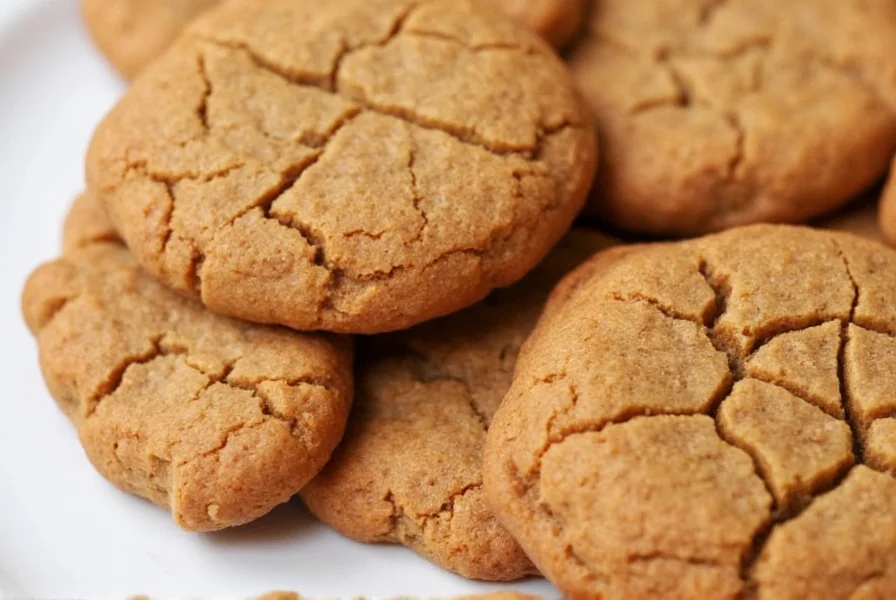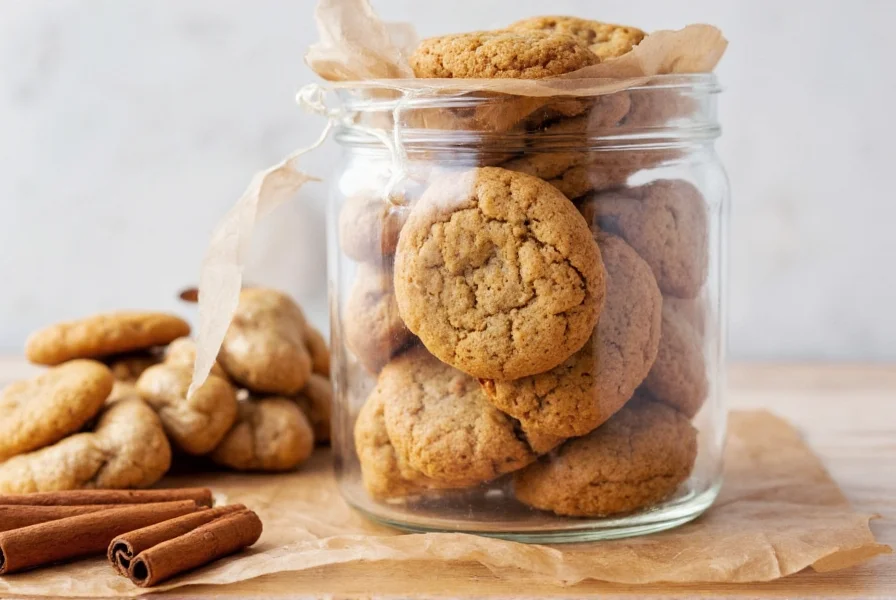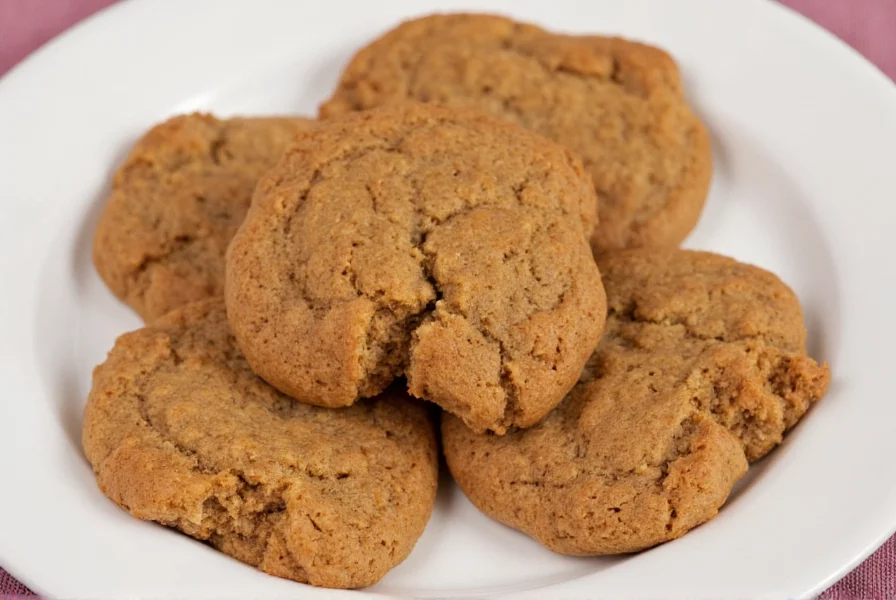Here's the complete recipe for perfect soft and chewy ginger cookies: Combine 1 cup softened butter, 1 cup brown sugar, 1/2 cup granulated sugar, and 1 large egg. Mix in 1/4 cup molasses, 2 1/4 cups all-purpose flour, 2 tsp ginger, 1 tsp cinnamon, 1/4 tsp cloves, 1/2 tsp baking soda, and 1/4 tsp salt. Chill dough for 2 hours, then scoop tablespoon-sized portions onto baking sheets. Bake at 350°F (175°C) for 10-12 minutes until edges are set but centers remain soft. Let cool on baking sheet for 5 minutes before transferring to wire racks.
There's something magical about the warm, spicy aroma of freshly baked ginger cookies filling your kitchen. This traditional recipe delivers the perfect balance of molasses sweetness and ginger spice, creating cookies that are soft in the center with just the right amount of chew. Unlike many recipes that produce overly crisp or cakey results, this method ensures consistently perfect ginger cookies every time you bake them.
Why This Ginger Cookies Recipe Works
The secret to exceptional ginger cookies lies in the precise balance of spices and the technique used to develop their signature texture. This recipe uses a combination of ground ginger and molasses that creates complex flavor notes without overwhelming heat. The chilling time is crucial—it prevents excessive spreading while allowing the flavors to meld. Many home bakers skip this step, resulting in flat, crispy cookies rather than the soft, chewy treats we're aiming for.
Ingredients for Perfect Ginger Cookies
Using quality ingredients makes a significant difference in your homemade ginger cookies. Here's what you'll need:
| Ingredient | Measurement | Notes |
|---|---|---|
| Unsalted butter | 1 cup (2 sticks) | Softened to room temperature |
| Brown sugar | 1 cup, packed | Use dark brown for richer flavor |
| Granulated sugar | 1/2 cup | For proper texture and spread |
| Molasses | 1/4 cup | Robust or dark molasses preferred |
| All-purpose flour | 2 1/4 cups | Spoon and level for accuracy |
| Ground ginger | 2 tsp | Freshly ground yields best flavor |
| Cinnamon | 1 tsp | Use Ceylon cinnamon if available |
| Cloves | 1/4 tsp | Ground, not too heavy-handed |
| Baking soda | 1/2 tsp | Fresh for proper rise |
| Salt | 1/4 tsp | Enhances all flavors |
Step-by-Step Baking Instructions
- Cream butter and sugars: In a large bowl, beat softened butter, brown sugar, and granulated sugar until light and fluffy (about 3 minutes).
- Add wet ingredients: Mix in egg until incorporated, then add molasses and blend thoroughly.
- Combine dry ingredients: In a separate bowl, whisk together flour, ginger, cinnamon, cloves, baking soda, and salt.
- Mix dough: Gradually add dry ingredients to wet ingredients, mixing until just combined. Avoid overmixing.
- Chill dough: Cover and refrigerate for at least 2 hours (or up to 48 hours for deeper flavor development).
- Preheat oven: Set to 350°F (175°C) with racks in the center position. Line baking sheets with parchment paper.
- Shape cookies: Scoop tablespoon-sized portions of dough, roll into balls, and if desired, roll in additional sugar.
- Bake: Place 2 inches apart on baking sheets. Bake 10-12 minutes until edges are set but centers appear slightly underbaked.
- Cool properly: Let cookies rest on baking sheet for 5 minutes before transferring to wire racks to cool completely.

Pro Tips for the Best Ginger Cookies
Mastering the best ginger cookie recipe requires attention to detail. Here are professional techniques to elevate your baking:
- Measure flour correctly: Spoon flour into measuring cups and level off—don't scoop directly from the bag, which compacts the flour and leads to dry cookies.
- Chill thoroughly: Properly chilled dough prevents excessive spreading. If your kitchen is warm, chill dough balls for 15 minutes before baking.
- Don't overbake: Remove cookies when they still look slightly underdone in the center—they'll continue cooking on the hot baking sheet.
- Use quality spices: Replace ground spices every 6-12 months for maximum flavor impact in your easy ginger cookie recipe.
- Room temperature ingredients: Ensure butter and eggs are properly softened for even mixing and proper texture.
Delicious Variations to Try
Once you've mastered the traditional ginger cookies recipe, experiment with these popular adaptations:
- Gluten-free ginger cookies: Substitute all-purpose flour with a quality 1:1 gluten-free baking blend.
- Extra-spicy version: Add 1/4 tsp black pepper or cayenne for a subtle heat kick.
- Lemon-zested: Incorporate 1 tbsp fresh lemon zest for a bright flavor contrast.
- Crystallized ginger: Fold in 1/2 cup finely chopped crystallized ginger for chewy bursts of intense flavor.
- Cookie sandwiches: Pair cooled cookies with cream cheese or lemon curd filling for an elegant treat.
Storage and Freezing Instructions
Proper storage ensures your soft ginger cookies maintain their ideal texture:
- Room temperature: Store in an airtight container with parchment between layers for up to 1 week.
- Freezing dough: Portion dough balls and freeze on baking sheets, then transfer to freezer bags for up to 3 months. Bake straight from frozen, adding 1-2 minutes to baking time.
- Freezing baked cookies: Cool completely, then freeze in single layers before transferring to freezer containers for up to 2 months.
- Reviving cookies: Place stale cookies on a baking sheet and warm in a 300°F oven for 3-5 minutes to restore softness.

Troubleshooting Common Ginger Cookie Problems
Even experienced bakers encounter issues with their molasses ginger cookies recipe. Here's how to fix common problems:
- Too flat: Dough wasn't chilled sufficiently, butter was too warm, or too much sugar was used. Chill dough longer and ensure accurate measurements.
- Too cakey: Too much flour or leavening. Measure flour properly and check baking soda freshness.
- Too hard: Overbaked or insufficient molasses. Remove cookies when centers still look soft and use robust molasses.
- Not enough spice: Spices may be old or measurements inaccurate. Use fresh spices and consider increasing ginger by 1/4 tsp.
- Spreading unevenly: Baking sheets may be too warm between batches. Use multiple sheets and let them cool completely before reuse.
Frequently Asked Questions
Can I make ginger cookies without molasses?
While molasses is essential for authentic ginger cookie flavor, you can substitute with 1/4 cup honey plus 2 tbsp dark corn syrup. The flavor profile will differ slightly, but you'll still get a delicious spicy cookie with proper texture.
Why do my ginger cookies spread too much?
Excessive spreading usually occurs when dough isn't chilled sufficiently, butter is too warm, or flour measurements are inaccurate. Ensure dough chills for at least 2 hours, use properly softened (not melted) butter, and spoon flour into measuring cups rather than scooping directly from the bag.
How can I make my ginger cookies chewier?
For chewier ginger cookies, increase brown sugar slightly (use 1 1/4 cups instead of 1 cup), reduce flour by 2 tablespoons, and remove cookies from the oven when centers still appear slightly underdone. The residual heat will finish cooking them while maintaining chewiness.
Can I freeze ginger cookie dough for later baking?
Yes, ginger cookie dough freezes exceptionally well. Portion dough into balls and freeze on a baking sheet, then transfer to freezer bags. Frozen dough balls can be baked straight from the freezer—just add 1-2 minutes to the baking time for perfect results up to 3 months later.
What's the difference between ginger snaps and soft ginger cookies?
Ginger snaps contain less fat and more sugar, creating a crisp texture throughout. Soft ginger cookies use a higher fat-to-flour ratio and more molasses, resulting in cookies that are tender in the center with slightly crisp edges. Baking time also differs—snaps bake longer for complete crispness throughout.











 浙公网安备
33010002000092号
浙公网安备
33010002000092号 浙B2-20120091-4
浙B2-20120091-4